Youths - don't take risks with Covid-19, please!
Mid-July 2020:
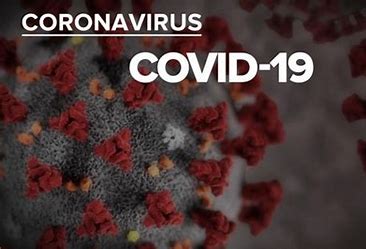
We are seeing more and more US states loosening restrictions so the economy can get going once again, and we are witnessing many young people who are going back to life as it was before the virus - with no social distancing, not wearing masks, getting together with hundreds of other young people in bars, at parties, etc. This is horribly risky behavior - both for themselves and for the more vulnerable people in society - the elderly, the obese, those with underlying kidney or respiratory problems, that could catch the Coronavirus from these young people and need hospitalization or even die from it.
You youths need to be aware that this is not a little flu, rather covid-19 has some very serious long-term disasterously negative effects on one's health for many, many survivors. You think that because you are young and strong that it won't hurt you. Well, you are wrong. It will hospitalize some of you and it will even kill some of you. Furthermore, it will probably or possibly cause long-term damage to your lungs and kidneys as well as your memory and ability to think. Seriously. We don't know how long-term this damage will be, but we know that it is a part of the problem. Many, many covid-19 "survivors" of all sexes and ages never fully recover! Don't play games and take risks with your long-term health. It's not worth it.
Back in March we knew so little about this virus. We assumed that it was a respiratory illness, only to find out that it affects almost every organ in the body. We assumed that we would rely on invasive ventilation and ICU only to find out that early CPAP (non-invasive ventilation with oxygen) on the medical wards was more effective.
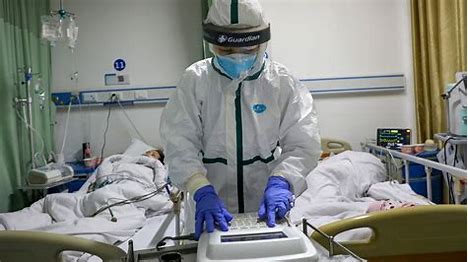
Four months on we have also become increasingly aware of the longer-term legacy for patients - not just those who have been in hospital, but those who have self-treated at home and recovered from the acute infection only to suffer from relapses and persistent symptoms. Patients who had the infection months ago are struggling to resume their normal lives.
For many who have had covid-19 and "recovered", the recovery has not been complete. "Being breathless is becoming my new norm" one says. On top of that she is experiencing waves of emotion, and having difficulty with her memory.
We know from studies of patients who had Sars - one of the family of coronaviruses - back in the 2003 epidemic, that almost half of survivors went on to have chronic fatigue or other long-lasting symptoms. So it should not be a surprise that this devious descendant, Sars-CoV2, should have a similar effect on its victims.
Some survivors are still suffering from the original symptoms of chest pains and breathlessness. Others have newer symptoms - headaches, memory loss and visual problems. Many have depression and anxiety. Most of them have persistent, chronic fatigue. All of them want their previous lives back. They celebrated their initial Covid-19 survival in haste and some are now filled with nagging doubt and deepening despair.
For a typical survivor the nightmare never ends: "For the first week, symptoms were quite mild - a headache, a sore throat, perhaps a slight fever. By the end of the week I thought she was coming out of it, but the next week I became breathless, and that breathlessness has stayed.It's been almost 4 months now."
Here's what happened to a top athlete in the UK.
Physiotherapist Molly Williams volunteered to work on the Covid wards, and she almost certainly caught the virus at work in the hospital. An elite gymnast throughout her teens, she has since taken up CrossFit - at the age of 34, she's one of the top 20 CrossFit athletes in the UK. But she too is experiencing breathlessness.
"My resting heart rate use to be 50 and now it's about 90," she says. "Even with talking I get breathless. I'm getting overwhelming muscular fatigue in my legs and my heart rate goes up to 133-plus on walking."
Molly says she also becomes uncontrollably tearful and "overwhelmingly upset about things". And she has been having problems with her memory.
"I'm forgetting things, and I'm repeating things a few times, I'm just not retaining information. If I try and remember a word I can't. I'm having to write things down all the time just to remember them," she says.
"I've no past medical history and for it to hit me the way it has is really hard."
We don't yet understand why these patients are having such long-term problems.
It is possible that the virus is lingering in reservoirs in their bodies and causing persistent symptoms, as we saw in survivors of ebola. Some of our patients are positive for the virus weeks after they first became infected but this is probably due to antigen-testing picking up residual fragments of the viral RNA. If so, these RNA fragments could be triggering a prolonged immune response that explains the persistent symptoms.
But more likely, these long-haulers are experiencing a prolonged and exaggerated immune response to the original infection, on top of the damage caused to their lungs and other organs.
Doctors are seeings that waves of tearfulness among Covid-19 survivors are very common and there is "an emerging picture" regarding cognitive difficulties, such as Molly's problems with her memory. Patients are not only developing cardiorespiratory complications, but they're also developing post-traumatic stress, anxiety, depression, and they've got neurological symptoms and chronic-fatigue-like symptoms.
"I think there could be a big iceberg out there of people who've had Covid-19 and just haven't got back to normal. Every week I'm getting three or four phone calls from GPs who are saying they've seen a patient who had Covid a couple of months ago, and they're still symptomatic," one doctor says.
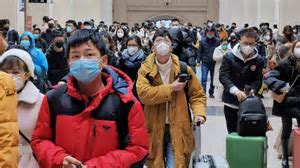
People - please take this virus seriously and help stop its transmission. Continue to practice social distancing. Wear respirators or high-quality masks when near others. Avoid indoor spaces especially poorly-ventilated ones.
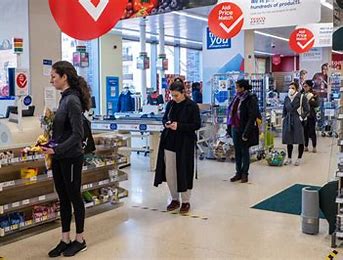
Wash your hands properly and often. Be responsible. Your social life can wait until next year, when we are more likely to have a vaccine and when we should understand more on preventing and treating covid-19. Do this for yourselves, and for the community and the society in which you live. It's vitally important for everyone. Thanks for your comprehension and for your cooperation!
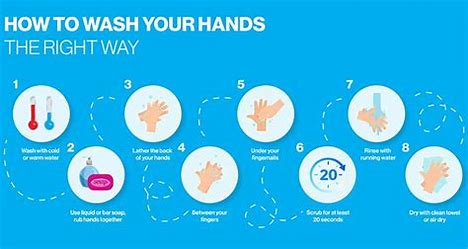
I recent report (July 2020) by the U.S. Center for Disease Control (CDC) shows that nonhospitalized COVID-19 illness can result in prolonged illness and persistent symptoms, even in young adults and persons with no or few chronic underlying medical conditions.
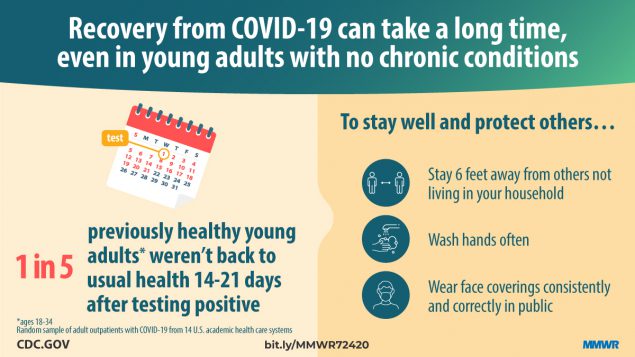
The CDC recommends that public health messaging should target populations that might not perceive COVID-19 illness as being severe or prolonged, including young adults and those without chronic underlying medical conditions. Preventative measures, including social distancing, frequent handwashing, and the consistent and correct use of face coverings in public, should be strongly encouraged to slow the spread of SARS-CoV-2.
